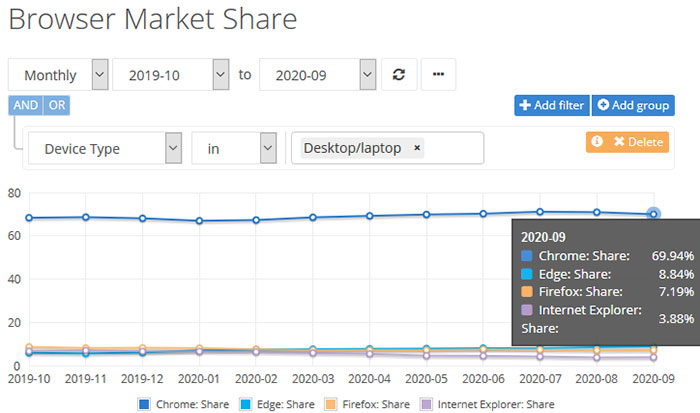Google Chrome is a long way ahead in the browser popularity race, commanding approx a 70 per cent market share according to the likes of StatCounter and NetMarketShare. Strikingly, none of its competitors (Edge, Firefox, IE, Safari, etc) even manage double digit percentage market shares. This is an enviable position for Google, but the company might be forced to give up at least one of its crown jewels due to growing pressure from the US government, expectations of imminent antitrust action by the US Justice Department, and the EU is also looking to make moves against the power wielded by tech giants.
Politico adds flavour to the above bubbling pot of circumstances with some tasty information morsels from "three people with knowledge of the discussions." In brief it reckons the Google / DOJ battle in the coming weeks could result in the first court-ordered break-up of a U.S. company in decades.

The insider trio told Politico that US State and DOJ Prosecutors are pondering how to dial back Google's dominance, and more specifically they are looking at "whether to force the company to sell its dominant Chrome browser and parts of its lucrative advertising business". The insiders, who wished to remain anonymous, say that no final decisions on potential action have been made. Prosecutors are still consulting advertising technology experts, industry rivals and media publishers for workable solutions. However, Politico notes that lawyers have singled out the potential sale of the Chrome browser, as it appears to exist outside of Google's advertising technology core market operations.
Google's Chrome browser has a lot of power in that it is seen to "effectively set standards for the industry," due to its dominance, said an antitrust report released by the House Judiciary Committee recently. Of course Google is motivated to use Chrome to maximise advertising revenue while outwardly voicing concerns about enhancing user privacy, a tricky and not entirely convincing balancing act.
Google's situation is seen by some as similar to the one Microsoft was in 20 years ago. The Redmond firm was accused by the US government of the time of illegally maintaining its monopoly position in the PC market using OEM pressure, and its moves to integrate the Windows OS and Internet Explorer (IE) web browser, to shut down competition.






